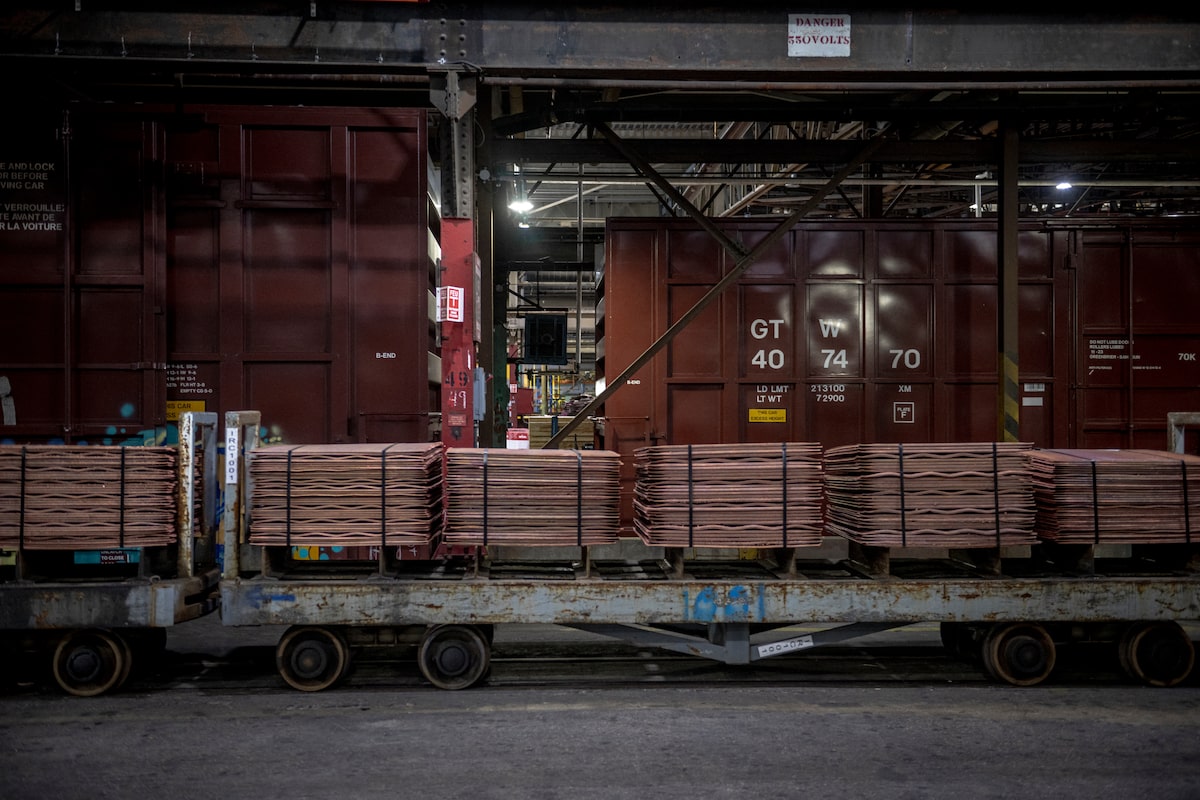According to Pierre Gratton, president of the Mining Association of Canada, the U.S. is unable to completely cut off copper imports from Canada because it does not produce enough for its own manufacturing needs.ANDREJ IVANOV/AFP/Getty Images
U.S. President Donald Trump on Wednesday imposed hefty new tariffs on imported copper products, though the duties largely spare Canada’s mining and refining industry.
Mr. Trump set the tariff for a range of copper products at 50 per cent starting Aug. 1, citing national security concerns for his latest attempt to bolster his country’s manufacturing sector by raising trade barriers.
The White House said it will slap the duty on copper pipes, wires, rods, sheets and tubes as well as derivative products such as pipe fittings, cables and electrical components.
However, copper concentrate and anodes and cathodes, semi-processed materials that companies in Canada produce and export in large volumes, as well as copper scrap, are exempt for the time being, it said.
When Mr. Trump said earlier this month he was preparing a round of tariffs on copper, Canadian government and mining officials worried about the threat of more financial pressure being heaped onto an economy already reeling from duties on steel, aluminum and autos. Copper is one of the most widely used metals, and seen as crucial to a future low-carbon economy for its use in such things as electric vehicles and clean energy.
Opinion: On tariffs, Trump is the opposite of unpredictable
The United States is unable to wean itself off copper imports from Canada because it does not produce enough for its own manufacturing needs, so exempting the materials from tariffs protects U.S. companies from surging costs, said Pierre Gratton, president of the Mining Association of Canada.
Mr. Gratton described the impact on his sector as “modest and possibly even negligible.”
“It’s much, much less than we feared, which is good news,” he said in an interview.
The U.S. accounted for $4.8-billion, or 52 per cent, of all the country’s exports of the metal in 2023, according to Natural Resources Canada.
Mined and refined copper may not remain exempt from duties indefinitely. In his proclamation, Mr. Trump said the administration will study U.S. copper markets and decide by June 30, 2026, whether to impose a 15-per-cent tariff on imported refined copper starting at the beginning of 2027 and double it the following year.
Canadian manufacturers of copper products such as wire and cable are exposed to the Aug. 1 tariff, though some may be able to shift trade to markets in other countries, Mr. Gratton said.
If not, mining companies may experience some financial impact if the downstream manufacturers are forced to reduce production, cutting demand for raw materials, he said.
Wire and cable shipments to the U.S. totalled nearly $705-million in 2024, representing 85 per cent of total exports of those products, according to Statistics Canada.
Mr. Trump proclaimed the copper tariffs as a deadline neared to reach a trade deal with Canada. The President has threatened to raise tariffs on Canadian goods that are not compliant with the U.S.-Mexico-Canada Agreement to 35 per cent from 25 per cent on Aug. 1 if an agreement is not reached.
Both he and Prime Minister Mark Carney have signalled that a deal by Friday may not be possible.
Trump signs order to impose threatened 50% tariffs on Brazil
Mr. Trump launched a Section 232 investigation into copper imports in February, a formal step toward imposing tariffs under the U.S. Trade Expansion Act. The investigation concluded that copper is a key input in defence systems, including aircraft, ships, submarines and ammunition.
“Foreign competitors’ predatory practices and excessive environmental regulations have undercut the American copper industry and domestic investment in smelting, refining, and fabrication facilities,” the White House said in a fact sheet.
“The U.S. now has a massive trade deficit in, and an unsustainable dependence on, many foreign copper products.”
One of the companies most vulnerable to any copper tariffs is Glencore PLC GLCNF. The major Swiss mining company operates the Kidd Creek mine in Ontario. It also runs the country’s only copper smelter, the Horne facility, and the Canadian Copper Refinery, both of which are in Quebec.
The company had little to say about the development on Wednesday. “We will review the decision and what this means for our Canadian copper business. At this stage we are not commenting further,” Charles Watenphul, Glencore’s head of corporate communications, said in an e-mail.
Copper mining operations in Western Canada would have largely avoided direct tariffs, as they ship their metal mostly to other markets. Teck Resources Ltd. TECK-B-T sends the copper it produces at its Highland Valley mine in British Columbia, Canada’s biggest copper mine, to Asia and Europe. The company remains bullish on the metal, announcing earlier this month that it is proceeding with a $2.4-billion extension project at that mine.
